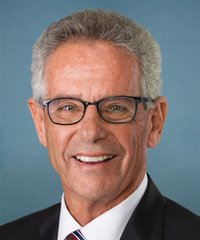
Congressman Alan Lowenthal is serving his fourth term in the U.S. House of Representatives representing California's 47th District, which encompasses portions of eastern Los Angeles County and western Orange County. He was first elected in 2012 and reelected in 2014, 2016, 2018, and 2020.
Prior to joining Congress, he served a two-decade tenure as, first, a Long Beach, California city council member, then, as a California legislator. In Washington, D.C., Congressman Lowenthal has continued his dedication to common-sense bipartisan solutions that earned him a reputation among his colleagues and constituents as one of the most respected and effective legislators in both Long Beach and Sacramento.
“Civic participation has been a driving force in my life. Ever since I can remember, I have been involved in trying to improve the current system – making it more transparent, more accountable, more responsive, and more responsible.”
SUMMARY OF STANCE
I will always fight to ensure the right of every American to vote. Voting is not just a cornerstone of our Republic, it is a right that empowers every citizen in our democracy. Critical to ensuring that everyone enjoys their full right to vote is making sure that elections are fair, that representation is equitable to all, and that campaigns and candidates are not unduly influenced by or beholden to special interests.
RELATED LEGISLATION AND ACTIONS
Introducing legislation is just one action that a member of Congress can take to address a concern or issue that impacts constituents. House Members can also introduce Congressional resolutions calling on the House (or even the full Congress) as a body to recognize or support a certain event or position on an issue. Members can write letters to government leaders requesting they take certain action, hold hearings with expert panels to address issues, work with colleagues at the committee level on specific issues, or even make direct in-person appeals to other Members or officials in the government. Here are a few examples of how I have taken action on this issue.
Reforming the Redistricting Process
The first bill I authored in Congress, H.R.2978, the “Let the People Draw the Lines Act,” would end gerrymandering of Congressional districts and give citizens more direct control of the redistricting process.
This bill provides clear and uniform redistricting criteria that give all communities around the country a fair and equal voice in the political process. The entire process will be transparent and open to the public – the way it should be. My bill gives citizens in every state the same ability Californians now have to choose their congressional district boundaries without the pure political considerations that still dominate in most states. Voters should choose their elected officials, rather than self-interested politicians choosing the constituents that they think will ensure their re-election.
When I was a member of the California State Legislature, I led the legislative efforts to create an independent Citizens Redistricting Commission for California, to take redistricting out of the hands of politicians and put it back into the hands of the people. I have always been a strong proponent of giving each and every citizen in our communities a fair and equal say in the political process.
I am determined to continue this fight in Congress.
Campaign Finance Reform
If addressing gerrymandering is needed to get the back room out of the ballot box, then addressing campaign financing is critical to getting big money out of the ballot box.
In the wake of the Citizens United Supreme Court ruling, which now allows corporations to contribute virtually limitless amounts of money to campaigns, it is even more critical that the way political campaigns are funded needs to be reformed so that funding is fair, transparent, and accountable to the public. Whether it is a congressional or presidential campaign, the American people deserve to know who has contributed and how much money they gave. In an age of limitless campaign contributions, voters have a right to know who the big contributors are and what small donors--which are the majority of Americans--can do to level the playing field so the voice of the people are not drowned out by billionaires and corporations.
This is why I cosponsored H.R.20, the “Government by the People Act,” which would establish a voluntary, competitive alternative to big money politics and reform the financing of congressional elections by broadening participation. This bill would multiply the impact of small donations from average citizens, allowing congressional candidates who take only small donations to be competitive with candidates backed by outside groups who are capable of raising and spending large sums of money. This will ensure that, in an age of unlimited campaign spending, the voice of the people is not drowned out, and is instead given a chance to be heard over big money interests.
To further accountability and transparency in our elections, I cosponsored H.J.Res.34, a bill that would require the sponsors of political advertisements to make the content and sources of information used in ads available to the Federal Elections Commission within 24 hours of their use.
Now, more than ever, Congress needs to redouble its efforts in passing campaign finance reform, including a constitutional amendment to overturn the Citizens United decision (a move I strongly support).
CAUCUSES OR MEMBERSHIPS RELATED TO ISSUE
Good Government Caucus
This is a group of more than 40 House Members who meet to promote, discuss, and share legislative ideas related to campaign finance reform with other legislators.